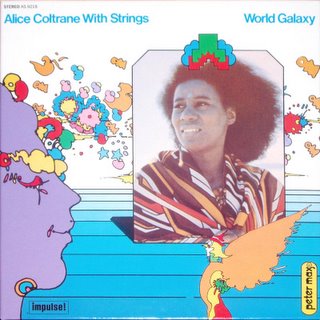
ALICE COLTRANE with strings
World Galaxy
impulse! AS-9128
Recorded 1971
1. My Favourite Things
2. Galaxy Around Olodumare
3. Galaxy In Turiya
4. Galaxy In Satchidananda
5. A Love Supreme
PERSONNEL
ALICE COLTRANE; piano, organ, harp, tamboura and percussion
FRANK LOWE; saxophones and percussion
LEROY JENKINS; solo violin (on A Love Supreme)
REGGIE WORKMAN; bass
BEN RILEY; drums
ELAYNE JONES; tympani
DAVID SACKSON; concertmaster
SWAMI SATCHIDANANDA; voice
and strings
Alice Coltrane spent the first few years of her post-John solo career in some sort of public mourning, paying tribute to her late husband whilst simultaneously continuing his legacy. Nowhere is that seen more clearly than on this 1971 LP, bookended by two of John's most famous pieces with some of her own compositions separating the two.
To take the record in reverse order, 'A Love Supreme' is perhaps the most appealing track on the record for jazz fans. It mostly resembles it's esteemed forebear, but instead of the classic quartet of sax-piano-bass-drums, we are treated to a funky organ breakdown with Alice coming over "like Booker T. on acid" as one commentator put it. 'My Favourite Things' does something similar, using the familiar theme as a framework for building a solo, although it's not as wild as before. Reggie Workman gets a chance to really let loose, though, with an outstanding solo that sees him leaping all over his bass.
The central portion of the record can be taken as one, being three variations on a theme. Waves of sumptuous strings bathe the listener in a warm wash of ambient sound that sounds about as far from bop as you can go - surely something John Coltrane would have approved of. Alice was very much influenced by eastern philosphy, and was a student of the guru Swami Satchidananda (who appears on a narration at the beginning of 'A Love Supreme'). The addition of her harp and tamboura gives an impression of these spiritual influences, and although the mood is sometimes dark, the music is always tuneful and accessible to western ears.


No comments:
Post a Comment